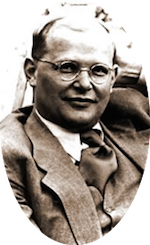by Matthew Franklin Cooper (The Heavy Anglo Orthodox). «It is with a Chestertonian apology that I write this article. It’s as if I am setting out to sea in search of some long-lost and uncharted land only to discover not only that many people have come thence before, but in fact it is the very same beloved home town I set sail from. Naturally there is a strong and deliberate connexion between the Russian Slavophils and the earliest of the Western Church Fathers—a connexion which indeed ought to be shared by Christendom in the main—and this modest contribution likely amounts to little more than a restatement of it. But it is still worth showing forth, again and again. Christian West and East are perhaps not as foreign to each other as one might be led to believe.»
What I learned about justice from Dorothy Day
by Jim Forest (U.S. Catholic). «Hers was a day-to-day way of the cross, and just as truly the way of the open door. ‹It is the living from day to day,› she said, ‹taking no thought for the morrow, seeing Christ in all who come to us, and trying literally to follow the gospel that resulted in this work.›»
How the Catholic Worker showed me what it means to be Catholic
by Shannon Evans (America: The Jesuit Review). « Catholicism had offered deep communion with a crucified God, a God who became man to suffer with us, a Christ who would go on to Resurrection but could first sit with me in my pain and understand. Because our incarnated Lord communed with me, I, too, could commune with human beings quite different from me. And not only that but I could receive the touch of Christ through their hands; I could see my suffering in theirs and we could both be healed just a little bit more. Because Christ became human, all humans belong to me and I to them.»
Two Chapters from Fr. John Ryan's 1916 book Distributive Justice: The Right and Wrong of Our Present Distribution of Wealth, republished by Daniel Schwindt on Catholic Front
• The Principal Canons of Distributive Justice «The canons of distribution applicable to our present study are mainly six in number: arithmetical equality; proportional needs; efforts and sacrifices; comparative productivity; relative scarcity; and human welfare.»
• The Legal Limitation of Fortunes «The sum of the matter seems to be that the reduction and prevention of great fortunes cannot prudently be accomplished by the method of direct limitation; that these ends may wisely and justly be attained indirectly, through the imposition of progressive income and inheritance taxes; but that the extent to which these measures would be genuinely effective cannot be estimated until they have been given a thorough trial.»
David B. Hart, ‹The Future of the Papacy,› and Ecumenism
by David Bentley Hart (The David B. Hart Appreciation Blog). «Moreover, our need for one another grows greater with the years. It is sometimes suggested that the future of society in the West—and so, perhaps, the world—is open to three “options”: Christianity, Islam, and a consumerism so devoid of transcendent values as to be, inevitably, nothing but a pervasive and pitiless nihilism. The last of these has the singular power of absorbing some of the energies of the other two without at first obviously draining them of their essences; the second enjoys a dogmatic warrant for militancy and a cultural cohesiveness born both of the clarity of its creed and the refining adversities of political and economic misfortune; but the only tools at Christianity’s disposal will be evangelism and unity. The confrontation between the Church and modern consumerism will continue to occur principally in the West, where a fresh infusion of Orthodoxy’s otherworldliness may prove a useful inoculant; but the encounter or confrontation with Islam will be principally, as it long has been, in the East. It is impossible to say what peace will be wrought there or what calamity, but it may well be that the Petrine office, with its unique capacity for “strengthening the brethren” and speaking the truth to the world, will prove indispensable.»


















No comments:
Post a Comment